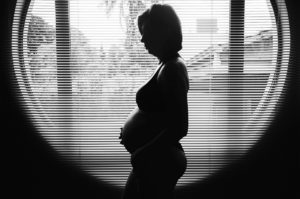Even the most wanted and anticipated of pregnancies can feel frightening at times. During pregnancy, a woman’s body goes through extreme and rapid changes that can leave her feeling uncertain or worried about herself and the pregnancy. Additionally, unplanned pregnancies come with a host of additional stressors, and can leave a woman feeling isolated.
 Pregnancy can bring unexpected emotions and anxieties.
Pregnancy can bring unexpected emotions and anxieties.
While many fears regarding pregnancy can be assuaged by regular healthcare visits, during which a medical doctor can determine whether or not the pregnancy is going as hoped, the risk of mental illness in women increases when pregnancy becomes a factor.
Potential Mental Health Concerns Associated with Pregnancy
Postpartum Depression – Possibly the most well known risk to a woman’s mental health comes after the baby is born. Postpartum depression can affect as many as 1 in 7 new mothers1.
Depression/Anxiety – A number of factors (some listed below) affect the likelihood of a pregnant woman developing depression and/or anxiety, including rapid hormonal changes.
Unplanned pregnancy – An unplanned pregnancy can cause an expectant mother or couple to experience a wide range of emotions, including anxiety. Fear and even panic are no uncommon initial reactions to learning of an unplanned pregnancy, even if the woman or couple planned on having children at another time.
Previous miscarriages – Women who have suffered a miscarriage in the past may feel uncontrollable fear about experiencing another one. Misplaced feelings of guilt (“Somehow I must have caused the miscarriage”) or a fear that she is unable to carry a child to term can plague expectant mothers.
Financial concerns – Expectant mothers of any age can experience worry regarding their financial capability to raise a child.
Existing Mental Illness – Because many pharmaceutical treatments for conditions such as depression, anxiety, bipolar disorder, and others can pose a risk to the developing fetus, women who suffer from these conditions many have concerns about taking or ceasing these medications. If a medical doctor recommends cessation, psychotherapy can be a viable alternative.
 Several factors can increase a woman’s risk of mental health disorders while pregnant.
Several factors can increase a woman’s risk of mental health disorders while pregnant.
Can These Mental Health Concerns Be Prevented?
In many cases, yes. Practising good mental health leading up to and during pregnancy can prevent your fears from turning into an anxiety disorder. Prevention is especially important for pregnant women, as recent studies have shown that feelings of distress, depression, and anxiety can affect the developing fetus. Proper preparation can even help prevent postpartum depression or significantly shorten its duration.
What to Do When Experiencing Fear or Anxiety Regarding Pregnancy
If you have emotional concerns regarding your pregnancy or believe you may be suffering from postpartum depression, it’s vital that you reach out for help. Our caring and confidential psychologists are here to help you sort through your fears and help you face your emotions. It’s easy for a woman (or soon-to-be-father) to feel ashamed of their negative emotions such as worry, fear, or even regret. Talking with a psychologist can help you accept your emotions and examine what’s causing them. Only then can you make sound decisions regarding the upcoming months.
 Talking with a psychologist can help prevent mental concerns during and after pregnancy.
Talking with a psychologist can help prevent mental concerns during and after pregnancy.
There’s no need to suffer through anxiety or feelings of fear, please reach out to me today.
